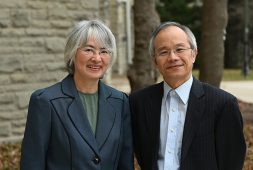
Isolation and loneliness can harm the body and cause brain atrophy, but engaging in social activities can help preserve brain health, according to a study. The research indicates that maintaining friendships and social connections is crucial for elderly individuals, as those who are more isolated are at a higher risk of brain shrinkage, particularly in regions linked to dementia, compared to those with regular social interactions.
“Social isolation is a growing problem for older adults,” said study author Toshiharu Ninomiya, MD, PhD, of Kyushu University in Fukuoka, Japan, in a recent statement made. “These results suggest that providing support for people to help them start and maintain their connections to others may be beneficial for preventing brain atrophy and the development of dementia.”
The research involved a sample of 9,000 Japanese adults aged 65 and above, all without dementia. Among these participants, 57 percent were women, and the average age was 73. Each person underwent MRI scans and a thorough health examination.
Dr. Ninomiya and colleagues gauged the frequency of social interactions by posing a single query: How often do you engage with relatives or friends who don’t live with you (such as meeting or talking on the phone)? The response options included every day, several times a week, several times a month, or seldom.
Published on July 12 in the journal Neurology, the study revealed that individuals with the least social contact had a total brain volume (combining gray and white matter) of 67.3 percent, whereas those with the most contact had a volume of 67.8 percent. Those with fewer social connections exhibited reduced brain volumes in crucial areas like the hippocampus and amygdala, which are vital for memory and are affected by dementia.
Additionally, the researchers noted a significant increase in white matter lesion volume among individuals with infrequent social contact—0.30 percent in the lowest frequency group compared to 0.26 percent in the highest frequency group. A prior study has already established a connection between white matter lesions and a heightened risk of cognitive impairment, dementia, depression, and stroke.
Depression Possibly Contributes to a ‘Vicious Cycle’ of Isolation
The investigative team observed that a connection between social isolation and changes in brain volumes was partially attributed to symptoms of depression. Nevertheless, it’s worth noting that these depression symptoms accounted for just a range of 15 percent to 29 percent of the observed association.
Nonetheless, Dr. Howard Fillit, co-founder and Chief Scientific Officer of the Alzheimer’s Drug Discovery Foundation, emphasizes that depression might exacerbate a negative cycle when it comes to social isolation.
“People who are socially isolated may become depressed, and the onset of Alzheimer’s disease is associated with depression 30 to 40 percent of the time,” says Dr. Fillit. It must be noted that the doctor was not part of the study. “Cognitive decline then can lead to more isolation and depression. It’s a vicious cycle.”
Loneliness May Lead to Physical Damage
Isolation can lead to health problems that extend beyond the realm of mental well-being. The National Council on Aging cautions that feelings of loneliness can increase the risk of developing high blood pressure, heart disease, obesity, a weakened immune system, anxiety, and even premature death.
Previous studies have suggested that loneliness might contribute to inflammation and oxidative stress, both of which can negatively impact blood vessels. Dr. Joel Salinas, a clinical assistant professor of neurology at NYU Langone Health in New York City, has noted that this effect on blood vessels could potentially be linked to brain shrinkage. However, he was not involved in the study. Dr. Salinas also serves as the chief medical officer at Isaac Health, an in-home memory clinic specializing in brain health and memory issues in New York City.
It’s important to note that the study in question does not establish a direct cause-and-effect relationship between social isolation and brain shrinkage; it merely demonstrates an association. Furthermore, the research was limited to older Japanese individuals, so the findings may not be applicable to people of different ethnic backgrounds or younger age groups.
“While this study is a snapshot in time and does not determine that social isolation causes brain atrophy, some studies have shown that exposing older people to socially stimulating groups stopped or even reversed declines in brain volume and improved thinking and memory skills, so it’s possible that interventions to improve people’s social isolation could prevent brain volume loss and the dementia that often follows,” Ninomiya said.
How Seniors May Attain Connection for Brain Health
Elderly individuals often grapple with emotions of solitude and social disconnection, as noted by Mirnova E. Ceide, MD, an associate professor specializing in geriatric psychiatry and geriatrics. She serves as the associate director of psychiatry at the Montefiore Center for the Aging Brain in Yonkers, New York.
“We see up to 40 percent of older adults experiencing social isolation,” Dr. Ceide, not a contributor to the paper, said. “Essentially, when you’re socially isolated, you’re not stimulating your brain, and as with any kind of organism, it needs stimulation. We see the brain acting differently when you’re not getting that stimulation that you normally would from interacting with people regularly. It’s a ‘use it or lose it’ situation.”
As we grow older, meeting new people can become more challenging. However, Ceide emphasizes the importance of proactive efforts in building and maintaining relationships among older individuals. She frequently advises her patients to contact their state department of aging, which typically provides information about senior centers and local organizations offering group events, outings, and classes. Additionally, the federally managed Eldercare Locatorserves as a valuable directory, connecting the public with services tailored to older adults and their families.
The National Institute on Aging encourages seniors to engage in various activities, such as playing cards, group travel, video chats with friends and family, trying out new restaurants, and participating in group hobbies like knitting, birdwatching, and painting. Another suggestion is to reconnect with old friends through high school or college alumni associations.
Salinas, based on his research, has noted that having someone reliable to talk to, someone available most or all of the time, is linked to enhanced cognitive resilience.
It’s also good to consider the hobbies you have. “It’s really great to find groups of people who have similar interests, because it helps to increase the likelihood that you’ll make a connection with somebody that’s reciprocal,” he added.



